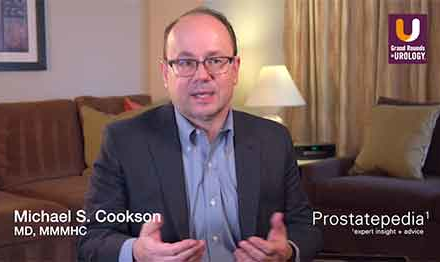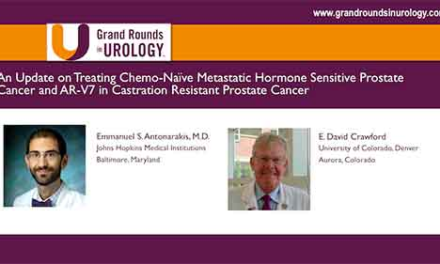Michael A. Gorin, MD, presented “Crossing the Divide from Transrectal to Transperineal Biopsy” for the Grand Rounds in Urology audience in June, 2020.
Presentation Summary:
Michael A. Gorin, MD, a urologist at Urology Associates of Cumberland, Maryland, and Director of Medical Affairs for Perineologic, discusses the benefits of transperineal prostate biopsy over transrectal biopsy. He notes that transrectal prostate biopsy leads to infections in 5-7% of patients, and argues that transperineal biopsy is the best alternative for avoiding infection. Dr. Gorin acknowledges that the use of a grid-stepper unit for performing transperineal biopsy can be uncomfortable for patients, but suggests that new technology and techniques like the PrecisionPoint™ Transperineal Access System solve many of these issues. The presentation is followed by a Q&A in which Dr. Gorin discusses the importance of new coding for transperineal biopsy and the potential of variable length needles.
Disclosures: Dr. Gorin is a consultant for Perineologic.
Q&A – Summary:
E. David Crawford, MD, interviews Michael A. Gorin, MD, on advances in transperineal prostate biopsy. When asked to predict what percentage of prostate biopsies will be performed transperineally in a year, Dr. Gorin opines that wider adoption of the technique will require a new insurance code, since it is currently billed under the same code as transrectal biopsy and doctors are therefore less well-compensated. Drs. Gorin and Crawford then discuss a new 3DBiopsy™ variable-length needle currently in development that Dr. Gorin suggests is critical for both transrectal and transperineal biopsy since it will allow urologists to take longer cores. Dr. Gorin concludes by affirming his commitment to teaching fellow urologists about transperineal biopsy.
How to cite: Gorin, Michael A. “Crossing the Divide from Transrectal to Transperineal Biopsy” June, 2020. Accessed Jul 2025. https://grandroundsinurology.com/managing-prostate-cancer-patients-and-lhrh-injection-times-during-covid-19/
ABOUT THE AUTHOR
Dr. Gorin is an Associate Professor of Urology in the Milton and Carroll Petrie Department of Urology at the Icahn School of Medicine at Mount Sinai. Dr. Gorin attended college at the University of Michigan, earning a Bachelor of Science in Cellular and Molecular Biology. He then attended medical school at the University of Miami Leonard M. Miller School of Medicine, where he graduated as an inductee to the Alpha Omega Alpha Honor Medical Society. Following medical school, Dr. Gorin completed a general surgery internship, urology residency, and fellowship in endoscopic and minimally invasive urology at the James Buchanan Brady Urological Institute at Johns Hopkins University School of Medicine.
Dr. Gorin is an internationally recognized expert on the use of molecular imaging techniques in the diagnosis and management of urologic malignancies. He is also widely recognized for his work developing novel methods for performing MRI-guided transperineal prostate biopsy and focal ablative treatments for prostate cancer. As a fellowship-trained endourologist, Dr. Gorin’s clinical practice primarily focuses on caring for patients with kidney stones, lower urinary tract symptoms, and prostate cancer.
Dr. Gorin has published over 300 articles in peer-reviewed journals with collaborators from around the world. Additionally, he has contributed to multiple medical textbooks, including chapters in Campbell-Walsh-Wein Urology, The 5-Minute Urology Consult, and Gray’s Anatomy. In July 2022, Dr. Gorin was selected to serve as Editor-in-Chief of BJUI Compass, the open-access companion journal to the BJU International. Dr. Gorin also serves on the editorial boards of several other journals, including UROLOGY (the Gold Journal), Urologic Oncology: Seminars and Original Investigations, and the World Journal of Urology. Dr. Gorin has received numerous honors and awards for his scholarly work, including the Drs. Carl and Barbara Alving Endowed Award for Outstanding Biomedical Research from the University of Miami Miller School of Medicine and the William F. Rienhoff, Jr., M.D. Scholar Award from Johns Hopkins University School of Medicine.




